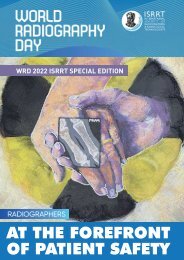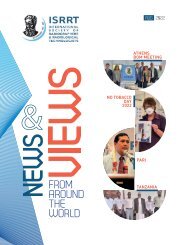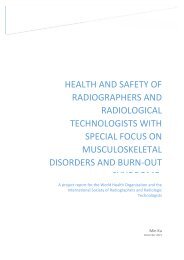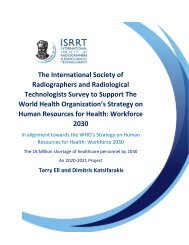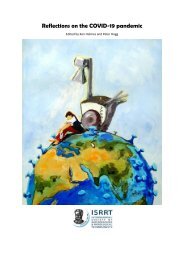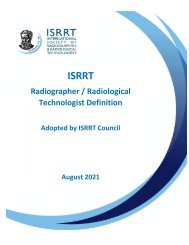2021_Book_TextbookOfPatientSafetyAndClin
Create successful ePaper yourself
Turn your PDF publications into a flip-book with our unique Google optimized e-Paper software.
24 Patient Safety in Laboratory Medicine<br />
cedures. Some authors have reported on their<br />
experience applying Failure Mode and Effect<br />
Analysis (FMEA) to critical activities using QI<br />
data. The reported findings demonstrate that the<br />
use of QIs to monitor errors and implement risk<br />
management procedures reduces the error rate,<br />
maximizes performance quality, and improves<br />
patient safety and health system outcomes [42].<br />
The promotion of continued improvement centers<br />
about the commitment of laboratory professionals<br />
to the management of QIs. The last few<br />
years have confirmed that the utility of QIs is<br />
closely linked to the recognition by all personnel<br />
involved of their importance and of the need to<br />
guarantee appropriate data collection as well as<br />
effective data analysis. To raise awareness in professionals,<br />
there has been a diffusion of consensually<br />
approved MQI and results that highlight<br />
achieved improvement, and professionals have<br />
been encouraged to assume responsibility. The<br />
continuous exchange of experiences among laboratory<br />
professional aim therefore to improve both<br />
the quality of the project and of laboratory services<br />
[41].<br />
24.2.3 Professional Competence:<br />
Education and Skill<br />
333<br />
In order to make the role of laboratory medicine<br />
in the context of patient care more visible, laboratory<br />
professionals must accept that they are members<br />
of a multidisciplinary team. Greater visibility<br />
in the form of rounds, committees, consultation,<br />
demonstration of knowledge, and self-promotion<br />
will be judged chiefly in relation to the clinical<br />
value they bring. Laboratory professionals must<br />
develop new competencies to highlight the contribution<br />
of laboratory information to patient<br />
management. Even knowledge of less traditional<br />
areas is required; this will bring new insights and<br />
approaches from other disciplines. Moreover,<br />
laboratory professionals must realize that the<br />
level of recognition achieved will be profoundly<br />
affected by continuous advancements in areas<br />
such as computerization, technology, clinical<br />
decision tools, informative media, and artificial<br />
neural networks. Laboratory medicine is a continuously<br />
evolving clinical discipline and emerging<br />
challenges require a revision and improvement<br />
of operational flows to enhance quality and safety<br />
in patients care. Laboratory professionals must<br />
maintain a high level of skills for achieving efficiency<br />
and effectiveness when delivering laboratory<br />
services [43]. To reduce diagnostic errors,<br />
the first-line intervention consists of education<br />
and training designed to improve knowledge and<br />
skills to guarantee relevant competency [23].<br />
Given the data reported above, it might be necessary<br />
to act on graduate education and training by<br />
rescheduling national programs, enhancing the<br />
duration and contents of courses given in laboratory<br />
medicine. Currently, however, only postgraduate<br />
initiatives are underway. The EFLM<br />
published the fifth edition of a syllabus for laboratory<br />
medicine outlining requirements for the<br />
postgraduate skills, knowledge, and competency<br />
needed to direct laboratory medicine services.<br />
The syllabus would not replace existing postgraduate<br />
programs, the aim being to harmonize<br />
the common principles of education and training<br />
of professionals working Europe in order to guarantee<br />
high standards of quality and safety. This<br />
initiative paves the way for the free migration of<br />
professionals and patients across EU national<br />
borders. While the fourth version of the syllabus<br />
was built with the specialist’s generic skills,<br />
knowledge, and competencies in mind, the fifth<br />
version details individual discipline requirements<br />
(such as those in clinical chemistry, immunology,<br />
hematology, blood transfusion, microbiology/<br />
virology, genetics, and in vitro fertilization) and<br />
includes new analytical techniques and statistics.<br />
Laboratory organization, quality, safety, and clinical<br />
governance have also been included as fundamental<br />
aspects of training, thus enabling the<br />
specialist in Laboratory Medicine to operate as a<br />
clinical leader who can support and transform<br />
healthcare services [44]. Given the recent changes<br />
in the nature of laboratory service and its role in<br />
the healthcare process, the new generation of<br />
laboratory professionals and leaders are then<br />
called upon to incorporate specific technical<br />
skills into a broader vision of healthcare and of<br />
patients’ needs. As shown in Table 24.1, the<br />
recently published “Manifesto for the future of











